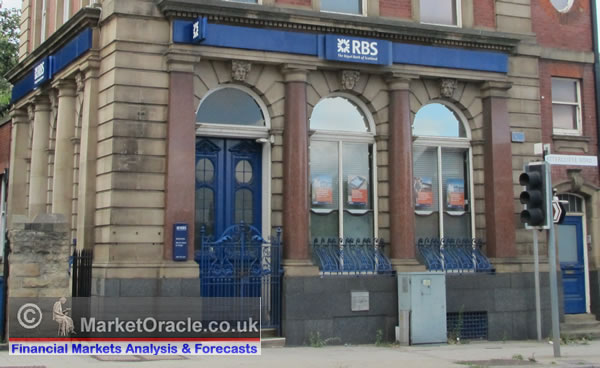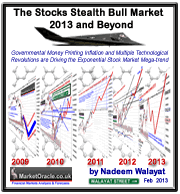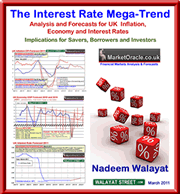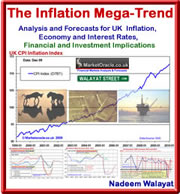RBS Fake Internal Bad Bank For Engineering Artificial Profits Bonuses on Asset Writedown's and Privatisation
Companies / Banksters Nov 01, 2013 - 03:36 PM GMTBy: Nadeem_Walayat
 Today's announcement by the Royal Bank of Scotland (RBS) that has seen its senior staff apparently been sat twiddling their thumbs for the past 5 years whilst collecting bonuses on the basis of fictitious profits are finally to get around to dealing with the banks bad debts by ring fence its worst performing assets / bad debts amounting to £38 billion in an INTERNAL bad bank which on face value goes against the wishes of last governor of the Bank of England who just wanted ALL of the bad toxic sludge to be dumped onto tax payers.
Today's announcement by the Royal Bank of Scotland (RBS) that has seen its senior staff apparently been sat twiddling their thumbs for the past 5 years whilst collecting bonuses on the basis of fictitious profits are finally to get around to dealing with the banks bad debts by ring fence its worst performing assets / bad debts amounting to £38 billion in an INTERNAL bad bank which on face value goes against the wishes of last governor of the Bank of England who just wanted ALL of the bad toxic sludge to be dumped onto tax payers.
12 Mar 2013 - Bank of England Governor's Last Cunning Plan to Transfer RBS Bad Debts onto Tax Payers
“I think that the whole idea of a bank that is 82pc-owned by the taxpayer but run at arms-length from the Government is a nonsense. It can not make any sense. ”
“I do not believe its beyond the wit of man to devise a plan to restructure RBS [and] divide it into a healthy well-capitalised bank capable of lending to the UK economy... It does mean accepting there are activities that are likely to generate continued losses... In that sense it would a be a good bank bad bank split.”

However today's announcement amounts to a mere smokes and mirrors exercise, much as has been the propaganda that RBS would soon be returning to profits which clearly it is not given the fact that it continues to pay out compensation claims and fines for a litany of past frauds perpetuated on its customers, hence the large Q3 pre-tax loss of £634mln against expectations for a £500mln profit, which comes just as signs of another mega-fraud is breaking as today RBS suspends two of its forex traders as part of investigations into manipulation of the $5 trillion daily foreign exchange markets.
The truth is that RBS remains bankrupt that only continues to exist as a consequence of artificial profitable cannot lose on revenues as a consequence of the tax payer bailouts and the ongoing Bank of England QE money printing programme that currently extends to well over £500 billion without which RBS and many other banks would have ceased to exist some 5 years ago.
Apparently the internal split will magically free up some £10 billion of capital, what smoke and mirrors would allow that to happen if all of the bad assets still remain within RBS itself ?
The answer is that the bad bank will NOT be internal but SEPERATE, where in the first instance that is how the regulators will look on it as two banks and thus allowing RBS to free up capital. Longer term the plan is for an actual separation between RBS Bank and the internal RBS Toxic bad debts Sludge bank that just as was the case with the Northern Rock bank sale to Virgin Money, at the point of privatisation / sale will have become SEPERATED from RBS and likely its assets sold at near 1/5th of that which RBS values the assets on its balance sheets.
In reality we are likely to see large chunks of the soon to be created internal bad bank systemically broken off and sold to the highest bidders so that it virtually ceases to exist as the political plan is clearly towards engineering the privatisation of RBS before the next election that the creation of an internal bad bank plays a critical role towards achieving.
Again RBS's senior staff should have spent the past 5 years of artificial QE money printing profits writing down the bad assets but instead been paying themselves billions in bonuses!
I fear that the internal RBS bad bank will further the fraud on tax payers as assets transferred to the bad bank could be heavily marked down in value which could then be sold at a profit and thus result in further massive bonuses for RBS staff, whilst obviously a heavy loss has been sustained on the GOOD bank! Which means that the Bad bank could out perform the Good bank, in terms of profits! Yes, given RBS and the big banks track record this is likely how the next fraud on tax payers will play out during 2014.
The bottom line is that the tax payers through direct bailouts and the money printing inflation stealth tax consequences continue to pump artificial profits into banks such as RBS. However with the formation of an internal bad bank (some 5years late!) as the bad assets evaporate (get sold off) then the Bank of England will likely reduce its funding of bank profits and thus RBS's revenues will shrink, which means that RBS will also continue to shrink in size long after it has been privatised, so it does not look like a good long-term investment proposition.
Source and Comments: http://www.marketoracle.co.uk/Article42939.html
Nadeem Walayat
Copyright © 2005-2013 Marketoracle.co.uk (Market Oracle Ltd). All rights reserved.
Nadeem Walayat has over 25 years experience of trading derivatives, portfolio management and analysing the financial markets, including one of few who both anticipated and Beat the 1987 Crash. Nadeem's forward looking analysis focuses on UK inflation, economy, interest rates and housing market. He is the author of four ebook's in the The Inflation Mega-Trend and Stocks Stealth Bull Market series.that can be downloaded for Free.
 Nadeem is the Editor of The Market Oracle, a FREE Daily Financial Markets Analysis & Forecasting online publication that presents in-depth analysis from over 600 experienced analysts on a range of views of the probable direction of the financial markets, thus enabling our readers to arrive at an informed opinion on future market direction. http://www.marketoracle.co.uk
Nadeem is the Editor of The Market Oracle, a FREE Daily Financial Markets Analysis & Forecasting online publication that presents in-depth analysis from over 600 experienced analysts on a range of views of the probable direction of the financial markets, thus enabling our readers to arrive at an informed opinion on future market direction. http://www.marketoracle.co.uk
Disclaimer: The above is a matter of opinion provided for general information purposes only and is not intended as investment advice. Information and analysis above are derived from sources and utilising methods believed to be reliable, but we cannot accept responsibility for any trading losses you may incur as a result of this analysis. Individuals should consult with their personal financial advisors before engaging in any trading activities.
Nadeem Walayat Archive |
© 2005-2022 http://www.MarketOracle.co.uk - The Market Oracle is a FREE Daily Financial Markets Analysis & Forecasting online publication.







